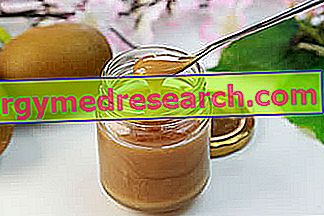To learn more about the individual properties of fiber supplements:
Bran
Guar and guar gum
Rubber Karaya
Psyllium, psyllium, psyllium seeds
Agar agar
glucomannan
Pectin
Despite the poor digestibility, dietary fiber is a complex mixture of substances essential for human health. Contained mainly in foods of vegetable origin, the fibers can also be added, as supplements, to a normal meal.

When they are placed in a low-calorie diet, the fibers and supplements that contain them contribute to reducing excess weight. In this sense, fiber supplements perform a dual function; on the one hand, if taken before meals, they limit the caloric intake by increasing the gastric content and dampening the stimulus of hunger, while on the other they interfere with the absorption of nutrients in the intestine. All this without contributing in any way to the caloric needs of the organism, since the fiber can be considered a nutrient without energy power. In the same way, those who consume a diet rich in fiber do a favor for their health because it replaces other foods that are bad for them. Eating a large apple before a meal, for example, reduces the gastric space available to other potentially harmful delicacies, such as cold cuts, fried and salted snacks or fat-rich meats.
The addition of fibers also has beneficial effects on metabolic control. After a meal rich in fiber, the absorption of sugars slows down, positively modulating the postprandial glycemic curve; analogous speech for cholesterol, whose concentration in the blood tends to decrease when passing from a refined diet to a diet rich in waste.
The mild laxative action of the fiber helps to reduce the time the toxins remain in the intestinal lumen, accelerating their elimination (lower risk of colon cancer).
The peculiar characteristic of absorbing considerable amounts of water requires that the intake of fiber supplements be accompanied by a generous intake of liquids, useful, among other things, to dilute the toxins present in the intestinal lumen.
The fiber is one of the most traditional and effective remedies against constipation. For this purpose, various products containing polysaccharides with a high swelling power are available. This characteristic contributes to accelerating intestinal motility, giving rise to a propulsive effect which, combining with the greater softness of the stools, ensures an easier evacuation. These supplements are therefore used by those suffering from constipation, hemorrhoids, diverticulosis and by all those who must avoid efforts in the act of defecating. The same is true in the case of diarrhea, since, by absorbing water in the intestinal lumen, the fiber exerts a constipating effect (in this case, however, it must not be taken with liquids).
It must be said, however, that it is much better to derive one's own daily fiber ration through the regular consumption of plant foods, rather than resorting to specific supplements. In this way, in fact, it is possible to benefit from the extraordinary set of microelements associated with them, obtaining a rather precious effect, because it is able to significantly contain diseases that are also very serious, such as vascular diseases, diabetes and some forms of cancer.
If taken individually in large doses, fiber supplements can even cause damage. Bran, for example, can cause mineral deficiencies, as it is rich in anti-nutritional factors, such as phytates, which interfere with the absorption of calcium and iron. Abdominal cramps and flatulence, while representing the most common undesirable effects of dietary fiber, are less worrying as they tend to fade with time.
Therefore, when choosing a dietary fiber supplement, one must know how to choose. For metabolic control, preference is given to those soluble or fermentable products (gums, pectins, oligofructoses, inulins, resistant starch), as they are capable, among other things, of lowering the intestinal pH exalting, contrary to what was seen in previously, the absorption of calcium and other minerals.
The best bran, with a more marked laxative effect, is that of wheat, because it is richer in insoluble fibers capable of absorbing large quantities of water.
The flax seeds, in addition to a generous fiber content, also boast a precious richness in omega-three. Integration with these natural products can therefore be particularly useful in the presence of high blood levels of triglycerides and cholesterol.
Fiber supplements, especially if in tablet form, should not be taken before going to bed, as they can cause oesophageal obstructions with consequent nocturnal asphyxiation by rapidly swelling. In general, its use is not recommended in the presence of intestinal obstructions or inflammation, pyloric stenosis, megacolon or megaretto, marked meteorism and functional dyspepsia.



